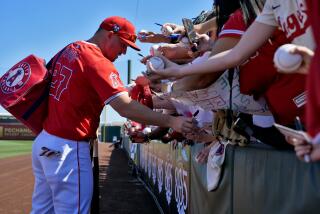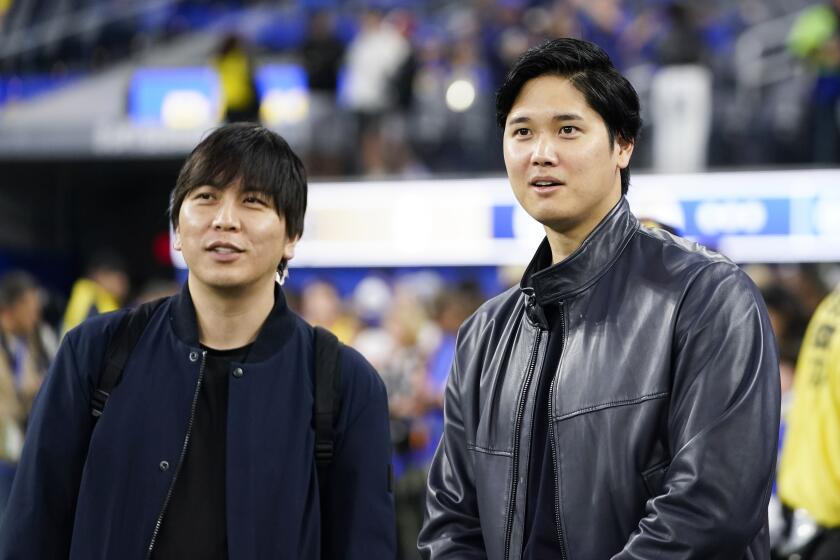Blyleven Selected AL Comeback Player
ANAHEIM — Bert Blyleven insisted that he hadn’t actually gone anywhere, but in truth, the burly right-hander seemed to have entered the twilight years. The signposts were a sub-.500 season and an earned-run average over five in 1988 at the age of 37, indications that he was nearing the end of a long and successful major league career. But not only did he refuse to go quietly, he refused to go at all.
“Steve Carlton told me to make ‘em rip the uniform off me, and Gaylord Perry said the same thing,” Blyleven said. “Determination keeps you going. That’s what keeps you young.”
Always young at heart, Blyleven last season found the fountain of youth for his arm in Anaheim. Rebounding from a thumb ligament injury that hampered him with the Twins in 1988, Blyleven was 17-5 in 1989 with a league-leading five shutouts and a 2.73 ERA, a performance that brought him the American League’s comeback player of the year award Thursday.
Blyleven, who last month won the same honor from The Sporting News, received 11 of 25 votes from United Press International baseball correspondents. Bret Saberhagen of Kansas City was second with six votes, followed by Nick Esasky of Boston, with two. Kirk McCaskill of the Angels and five other players each received one vote.
Joking is as much a part of Blyleven’s repertoire as his breaking ball, and he was in midseason jesting form at a luncheon given by the Angels Thursday. “I’m not a spring chicken. They’ve got to give the old man something before he leaves,” he said.
“The biggest honor is that this is something the writers give out,” said Blyleven, who led the Angels’ pitching staff in victories and helped keep the team ERA at 3.28, second-lowest in the AL. “My first year (1970 at Minnesota), winning rookie pitcher of the year was quite an honor. After that, I don’t think I won another award besides the World Series (with the Twins in 1987) and you get a trophy and your ring. . . . I always felt the comeback player should be presented to someone coming off a major injury. In 1984 with Cleveland, maybe I should have won it after having a major operation in 1982. But then, you look at the year I had in ‘88, and this is definitely a comeback.”
Fortified by confidence gained in their surprising--but unsuccessful--bid for the AL West title, Blyleven expects the Angels to come back even stronger next season.
“I think we have the right nucleus. What we need is a couple of added additions to get us over the hump,” Blyleven said. “Hopefully, we’ll go after Joe Carter or Robin Yount, if he’s available. And Jeff Reardon--that would help Bryan Harvey out. I’ve read Dennis Lamp’s name, too. I think the ballclub realizes that on a position-by-position basis, we have a real solid ballclub. We just have to go out and see if we can improve. I know Mike (Port, the general manager) and Doug (Rader, the manager) are thinking that way, and hopefully, Mr. Autry (owner Gene Autry) will let them do that. . . . If we go out and get a Joe Carter or a Robin Yount, that might free Wally (Joyner) to bat in another position or put not as much stress on Chili (Davis) to be our big RBI man.”
Providing, of course, that there is a 1990 season. With owners threatening a spring-training lockout and players talking of a strike if a new collective bargaining agreement isn’t formulated, the prospects are uncertain. Blyleven hopes the threats don’t become reality, but he was critical of the owners’ proposals of basing salaries on performance.
“I don’t see how that can work,” Blyleven said. “A guy could lead off an inning with a double and (the next batter is) not going to want to give himself up for the team and move the runner over because he’s got a possible RBI and more money. That’s not a team concept, it’s greed, and that’s not what baseball is all about. (It would be more reasonable) if they can give credit for assists. People always make a big deal about Magic (Johnson) and his assists. Hopefully, something can be worked out. I’m optimistic it can.”
He’s also optimistic he can pitch another three or four years, long enough to play with his son, Todd, a senior pitcher at Villa Park High School who figures to be among the top five players chosen in next year’s draft.
More to Read
Go beyond the scoreboard
Get the latest on L.A.'s teams in the daily Sports Report newsletter.
You may occasionally receive promotional content from the Los Angeles Times.







